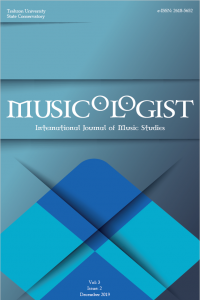Abstract
References
- Baker, Ulus. (2012). Kanaatlerden imajlara: Duygular sosyolojisine doğru. (From convictions to images: Towards the sociology of affect (. Istanbul: Birikim Publications
- Bayart, Jean-François. (1999). Kimlik Yanılsaması (Illusion of identity). Istanbul: Metis Publications.
- Bayram, Sibel. (2011). “Boşnak Şiirinde İstanbul” (Istanbul in Bosnian Poetry). Yeni Türk Edebiyatı Araştırmaları Dergisi. 3(5): 53-68.
- Deleuze, Gilles. (2000). Spinoza üzerine on bir ders. (Eleven lectures on Spinoza). Ankara: Öteki Publications.
- Han, Byung-Chul. (2019). Psikopolitika: Neoliberalizm ve Yeni İktidar Teknikleri (Psychopolitics: Neoliberalism and New Technologies of Power). Metis Publications.
- Jezernik, Bozidar (ed). (2012). Hayallerdeki “Türk” (Imagining the “Turc”). İstanbul: Kitap Publications
- Kaiser, Robert G. (1994). The Geography of Nationalism in Russia and the USSR. Princeton (N.J.): Princeton University Press.
- Lawler, Edward J. (2001). “An Affect Theory of Social Exchange.” American Journal of Sociology, University of Chicago Press. 107(2): 321-352.
- Lomax. Alan. (1956). “Folk Song Style: Notes on a Systematic Approach to the Study of Folk Song”. Journal of the International Folk Music Council, (8):48-50.
- Marshall, Gordon. (1999). Sosyoloji Sözlüğü (Dictionary of Sociology). Ankara: Bilim ve Sanat Publications.
- Spinoza, (2011). Etika. (Ülken, Hilmi Ziya, Trans.). Ankara: Dost Kitabevi Publications. [Original work published 1678]
- Talam, Jasmina. (2013). Folk Musical Instruments in Bosnia and Herzegovina. New Castle upon Tyne: Cambridge Scholars Publishing.
- Thrift, Nigel. (2004). “Intensities of feeling: Towards a spatial politics of affect.” Geografiska Annaler, 86B(1): 57–78.
- Various Artists. (2007). Sevdalinka – Sarajevo Love Songs. (CD) Almanya: Piranha.
Abstract
There are different types of migration,
however, new concepts and redefinitions of certain concepts are needed, because
of the changing reasons for migration as well as various imaginings of the
places and spaces in concrete and virtual terms. This paper coins the phrase
’interhomeland migration’ as a type of migration through addressing how the
concept of homeland is constructed through affect, and who constitutes this
migrant type.
The data, obtained from fieldwork executed
with those who identify themselves as Bosniaks (especially in Istanbul and
nearby cities) since 2004 and with the Turkish-speaking people living in Bulgaria
between 2013 and 201,5 is assessed by the means of analyses of both the
discourses and various musical elements. In these examples, the affect of
homeland is constituted by religion, flag, blood, land, especially fighting for
the sake of this land, vague and non-objective nationalist concepts, shared
historical and cultural background, such as musical values in addition to born
and grown lands. Interhomelands migrant type experiences the affects containing
contrasts all together such as feeling alike, feeling strange, feeling the
belonging. These affects cause to uncover the similarities on the one hand and
on the contrary to underline the dissimilarities on the other hand.
Keywords
References
- Baker, Ulus. (2012). Kanaatlerden imajlara: Duygular sosyolojisine doğru. (From convictions to images: Towards the sociology of affect (. Istanbul: Birikim Publications
- Bayart, Jean-François. (1999). Kimlik Yanılsaması (Illusion of identity). Istanbul: Metis Publications.
- Bayram, Sibel. (2011). “Boşnak Şiirinde İstanbul” (Istanbul in Bosnian Poetry). Yeni Türk Edebiyatı Araştırmaları Dergisi. 3(5): 53-68.
- Deleuze, Gilles. (2000). Spinoza üzerine on bir ders. (Eleven lectures on Spinoza). Ankara: Öteki Publications.
- Han, Byung-Chul. (2019). Psikopolitika: Neoliberalizm ve Yeni İktidar Teknikleri (Psychopolitics: Neoliberalism and New Technologies of Power). Metis Publications.
- Jezernik, Bozidar (ed). (2012). Hayallerdeki “Türk” (Imagining the “Turc”). İstanbul: Kitap Publications
- Kaiser, Robert G. (1994). The Geography of Nationalism in Russia and the USSR. Princeton (N.J.): Princeton University Press.
- Lawler, Edward J. (2001). “An Affect Theory of Social Exchange.” American Journal of Sociology, University of Chicago Press. 107(2): 321-352.
- Lomax. Alan. (1956). “Folk Song Style: Notes on a Systematic Approach to the Study of Folk Song”. Journal of the International Folk Music Council, (8):48-50.
- Marshall, Gordon. (1999). Sosyoloji Sözlüğü (Dictionary of Sociology). Ankara: Bilim ve Sanat Publications.
- Spinoza, (2011). Etika. (Ülken, Hilmi Ziya, Trans.). Ankara: Dost Kitabevi Publications. [Original work published 1678]
- Talam, Jasmina. (2013). Folk Musical Instruments in Bosnia and Herzegovina. New Castle upon Tyne: Cambridge Scholars Publishing.
- Thrift, Nigel. (2004). “Intensities of feeling: Towards a spatial politics of affect.” Geografiska Annaler, 86B(1): 57–78.
- Various Artists. (2007). Sevdalinka – Sarajevo Love Songs. (CD) Almanya: Piranha.
Details
| Primary Language | English |
|---|---|
| Subjects | Music |
| Journal Section | Articles |
| Authors | |
| Publication Date | December 31, 2019 |
| Published in Issue | Year 2019 Volume: 3 Issue: 2 |

